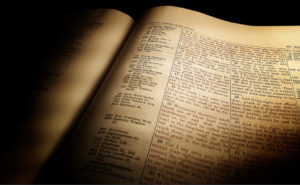 Psalm 119:105 (NKJV) 105 Your word is a lamp to my feet And a light to my path.
Psalm 119:105 (NKJV) 105 Your word is a lamp to my feet And a light to my path.
When I was growing up I was taught that the only way I could grow as a Christian was through church attendance, the Eucharist (Communion, The Lord’s Table), and the sacraments of the church. I was never exposed to any kind of systematic reading of the Scriptures or devotional studies. While the church I belonged to, from about 1965, (Vatican II) allowed and some-what encouraged people to read the Bible[1], I never met a single person who really did spend any real time in the Word. Frankly, it was understandable since it is the Church’s Tradition that interprets the Scriptures[2],[3] through the Magisterium[4] and they deny Sola Scriptura[5]. So, it comes as no surprise that the Scriptures are not read. The reliance for spirituality was grounded in the former.
Once I became a Bible-believing Christian, through repentance and faith in the finished work of Christ, I immediately saw the need for real Bible study. The Bible had become an open book for the most part, and I found myself captivated by it. Reading the “Word of God” became a joy and a constant amazement to me. I saw it as essential to my spiritual growth (2 Timothy 3:16-17; Hebrews 4:12; Psalm 40:7; 119:97-104,105,111,129-130; Isaiah 34:16; 2 Timothy 2:15; Acts 17:11).
If this be the case, that the Word of God is essential to our spiritual growth, and our understanding of God and Christ, then let us be diligent (2 Timothy 2:15) to the Word.
I can think of no better way to begin such an endeavor than taking time out of the day for just that, the reading of God’s Word. There are endless ways to go about this, but one is a scheduled reading of the Bible each day. Let me share two great plans:
One is the 5 Day Bible Reading Program from Bible Class Material. It is a pseudo-chronological plan that covers the text of the Bible in the order the events happened. For instance, the Psalms come at appropriate moments in the life of David, the books of Kings and Chronicles are read in harmony, and so on. But this plan is also interspersed with other readings such as the Gospels throughout the year. I like it because you read through the whole Bible in a year and it allows for two days for alternate reading or for you to catch up if for some reason, you missed a day. It can be downloaded at; http://www.bibleclassmaterial.com/Catalog/Mark%20Roberts/BibleReadingSchedule.htm.
The other is a less aggressive plan that takes you through the New Testament only, called, “The 5x5x5 Plan”. It is also a five day a week reading plan.
Ligioniers has several other plans you can look at as well at; http://www.ligonier.org/blog/bible-reading-plans/
These plans, and others are a great place to start the new year as well as supplement any other devotional reading you are doing. If you are wanting to commit for the first time to the reading of the Scriptures and are fearful you might stop, try the 5x5x5 Plan. As I mentioned earlier, it is not as aggressive and will give you a solid grounding in the New Testament.
-Michael Holtzinger
